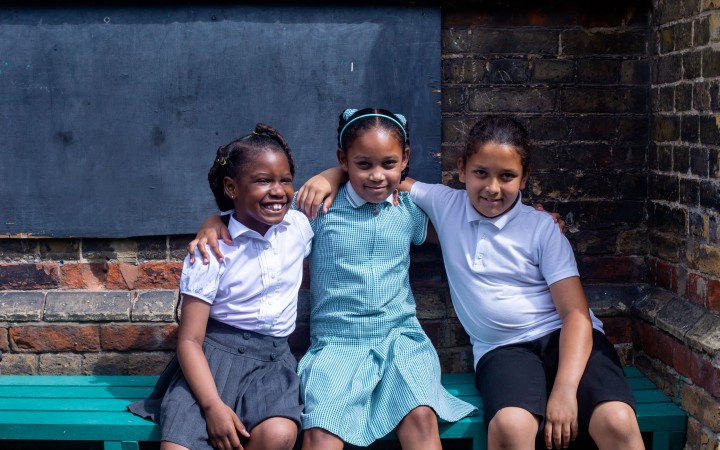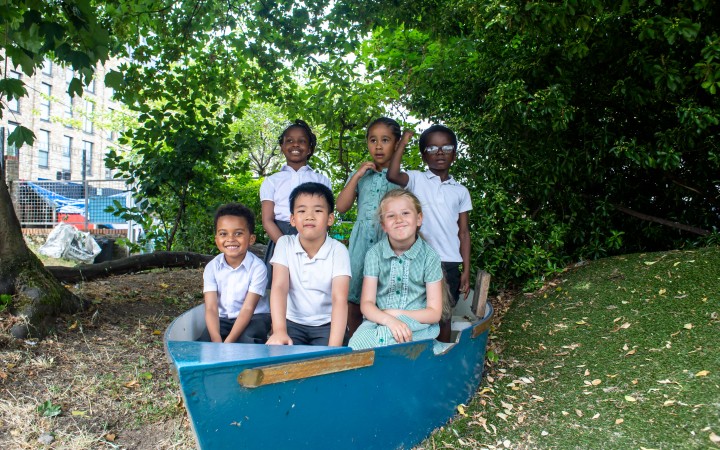Early Years Foundation Stage
"Staff in the early years provide a caring and well-organised environment for all children."
Ofsted Report -December 2021
Nursery and Reception classes are known as the Foundation Stage and follow the Early Years Foundation Stage framework.
The PowerPoint from the Reception transition meetings held on 24th & 25th June 2021 can be found in the link below:
 Reception Transition Meeting 2021
Reception Transition Meeting 2021
The Early Years Foundation Stage (EYFS) is a curriculum for children aged three to five years old. This is broken down into three prime aspects and four specific areas of learning.
Personal, Social and Emotional Development
One of the main aspects of your child’s time in EYFS will be a focus on their personal, social and emotional development. They will be encouraged to develop positive relationships, play with a variety of friends and to understand the feelings of others. There will be opportunities to build confidence and self-awareness and also to manage their feelings and behaviour.
Play dates with friends and after school or trips to see family and friends at the weekend will also help to increase development in this area.
Communication
Communication is a key area of your child’s learning in EYFS. In the Nursery they will spend lots of time sharing rhymes, songs, stories and playing games to develop their speaking and listening skills. They will be encouraged to learn to listen carefully, to develop concentration, to respond to questions and instructions, to share ideas and experiences and to take part in conversations.
As they move into Reception, children will learn the basics of literacy: reading, writing and phonics. They will begin to develop the skills for reading by following a programme of synthetic phonics. At St Alfege with St Peter's we aim to learn four sounds per week. In addition to this we will share many stories, especially those with repetitive patterns and rhymes. This will help the children to join in with stories and so that they can retell them in a variety of ways.
Literacy
The ‘Communication’ section above outlines some activities to develop speaking and listening skills. In addition to sharing lots of stories, your child will probably be encouraged to handle and look at books independently and to begin to learn about how stories are structured. There will be opportunities for your child to recognise and copy the letters in their name. Your child will be encouraged to draw, paint and make to develop control and hand-eye co-ordination.
Physical Development
Your child will be given lots of opportunities to move in different ways, for example, running, jumping, balancing and playing with balls. Another important aspect of physical development at this stage is learning to hold and use tools, such as scissors and also to use pencils and pens to draw lines and shapes.
Your child will also begin to understand how to look after themselves and be healthy. Snacks of fruit are offered throughout the day as well as water. However, your child is more than welcome to bring their own water bottle to school.
If your child is having a packed lunch in school, please ensure that it contains healthy foods.
Mathematics
In EYFS your child will be given many opportunities to explore numbers and shapes in their play. For example, they may be encouraged to count objects they are playing with and to compare two groups of objects. In the nursery children will begin to represent numbers using their fingers, marks on paper or pictures.
There are all sorts of ways to encourage number recognition. Try to involve your child in using numbers at home by singing number rhymes and songs or by encouraging them to recognise and read numbers when you are in the car. When shopping, ask them to select the number of apples or bananas you need — they’re helping you out, and learning at the same time.
Understanding the World
Your child will learn about the world around them and they will be encouraged to use simple technology and equipment.
Expressive Arts
Finally, imagination and creativity are explored and developed in the area of expressive arts. Your child will explore different media and materials and be encouraged to use their imagination in a range of different experiences.
Most of the time your child will be learning all seven areas of learning together. So if they spends lots of time in the sand area there’s no need for concern! They may well be covering all kinds of important learning: working with different materials; finding out about shape, quantity and volume; creating imaginative worlds; feeling different textures; and even developing motor skills and strength for writing!
The importance of play
In EYFS your child will begin to learn by doing things for themselves; by exploring and investigating, watching and listening, talking and discussing, creating and communicating – in other words, playing. Play is children’s work and playing hard is very tiring! Play can also be very messy as your child will be learning both inside with sand, water and paint, and also in the outdoors with mud, leaves and so on, so you can expect some mucky clothes at the end of the day! Therefore, please ensure that you child always has a change of clothing in school and that if a change is needed throughout the day, you return any missing items the next day and if loaned any of the school’s items these are washed, returned and ready to be used again.
Help with phonics
In Reception, talk to your child about individual letters (especially the letters in their name) and their sounds. Singing songs and nursery rhymes really helps them to find out more about letters and sounds. Play I-spy when you go out (using the sound the letter makes, rather than its name). Phonics support workshops will be offered to parents in Autumn 2.
Reception children have been given a sound book to use to support their phonetic development at home. New sounds will be added each week. Please encourage your child to say these sounds aloud and use the space provided to write any words that contain the sound. Also, you could help your child to find words containing these sounds in their books.
|
s |
sat, sin, sit |
|
a |
ant, at, as |
|
p |
pin, pat, pan |
|
i |
in |
|
n |
nip, |
Getting dressed independently
When your child moves into Reception it is really useful if your child can have a go at dressing themselves at home so that they can do it themselves during the day. It’s often quite time-consuming for teachers to have to do up 30 zips on wriggly children bursting to go outside!
Organisational skills are essential and the more children can do independently the better it is for their confidence and the more time we all have to play and learn.
How can I help my child?
Talking and listening
It seems very obvious, but at this stage one of the best things you can do for your child’s learning is to spend time talking together. They are constantly learning new words and will be exploring ways to build sentences and put words together through trial and error. Encourage eye contact and back-and-forth conversation. Get them talking about the toys they are playing with. Ask them for their opinion about things – what is their favourite piece of equipment to play on in the park and why? Chat together about what you need to buy from the shop and encourage them to help you find items.
Why not try baking together? This is a fun way to learn to follow instructions and to chat together about what you are doing.
Read, read, read
Time spent reading together brings so many benefits to your child – and you! Through reading, your child will hear lots of words that they might not be as likely to come across in everyday conversation. They will also develop their listening skills and develop their understanding of how stories work. Rhythm and rhyme are so important for early language development and, luckily, there are lots of wonderful books available from our class library that your child will take home to share. Encourage your child to talk about the pictures, or to make predictions about what will happen next.
There's no reason reading should be limited to stories, either – why not encourage your child to recognise and read print when you are out shopping, on the bus or at the park?
Songs and rhymes
Have lots of fun singing songs and nursery rhymes together. Don’t worry about how good your singing voice is! Singing songs and saying rhymes can help your child to develop early language skills.
Numbers on the go
Point out the numbers you see when you are out and about and encourage your child to do the same. Look for bus numbers, prices and house numbers. When shopping, ask your child to select the number of apples or bananas you need – they’re helping you out, and learning at the same time.
Dressing up
Dressing up and role play are great opportunities for talking and listening and for imaginative play. On a practical level, a fun dressing up session can help your child to practise getting themselves dressed. You can fit in a sneaky bit of training with those tricky zips, armholes and buttons.
Tapestry
It's just as important for us to know what is happening with your child’s development at home as it is for you to know what is going on in school. For instance if we know what your child is interested in at home we can try to incorporate your child’s interests into the planning. The best way for us to do this is via our online system ‘Tapestry’. We add observations and updates on what they are achieving throughout each half term and you can like these and add comments too, which we really like to see. Equally if you or your child wants to share things from home or a day out, these can be uploaded for us to see. We love the posts from home so please share with us.
 Early Years and Foundation Stage Policy
Early Years and Foundation Stage Policy


